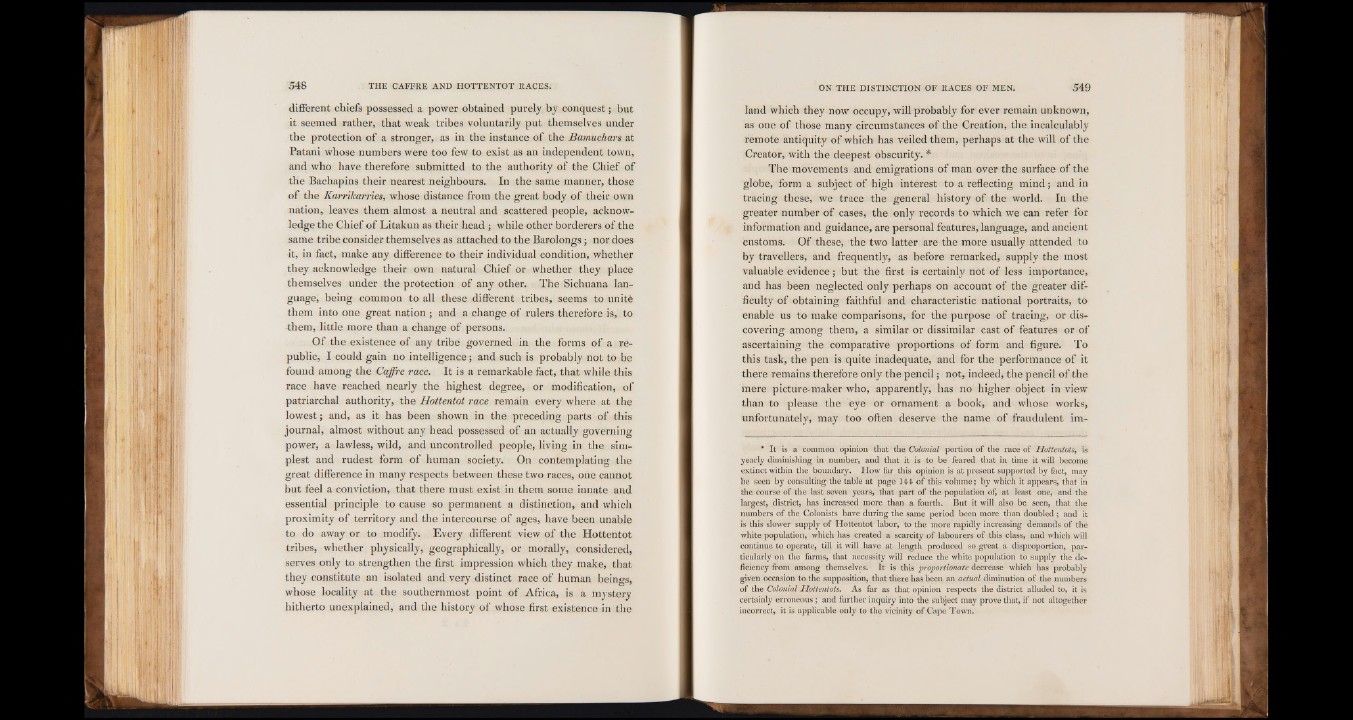
different chiefs possessed a power obtained purely by conquest ; but
it seemed rather, that weak tribes voluntarily put themselves under
the protection of a stronger, as in the instance of the Bamuchars at
Patani whose numbers were too few to exist as an independent town,
and who have therefore submitted to the authority of the Chief of
the Bachapins their nearest neighbours. In the same manner, those
o f the Karrikarries, whose distance from the great body of their own
nation, leaves them almost a neutral and scattered people, acknowledge
the Chief of Litakun as their head ; while other borderers of the
same tribe consider themselves as attached to the Barolongs ; nor does
it, in fact, make any difference to their individual condition, whether
they acknowledge their own natural Chief or whether they place
themselves under the protection of any other. The Sichuana language,
being common to all these different tribes, seems to unité
them into one great nation ; and a change of rulers therefore is, to
them, little more than a change of persons.
Of the existence of any tribe governed in the forms of a republic,
I could gain no intelligence ; and such is probably not to be
found among the Coffre race. It is a remarkable fact, that while this
race have reached nearly the highest degree, or modification, of
patriarchal authority, the Hottentot race remain every where at the
lowest ; and, as it has been shown in the preceding parts of this
journal, almost without any head possessed of an actually governing
power, a lawless, wild, and uncontrolled people, living in the simplest
and rudest form of human society. On contemplating the
great difference in many respects between these two races, one cannot
but feel a conviction, that there must exist in them some innate and
essential principle to cause so permanent a distinction, and which
proximity of territory and the intercourse of ages, have been unable
to do away or to modify. Every different view of the Hottentot
tribes, whether physically, geographically, or morally, considered,
serves only to strengthen the first impression which they make, that
they constitute an isolated and very distinct race of human beings,
whose locality at the southernmost point of Africa, is a mystery
hitherto unexplained, and the history of whose first existence in the
land which they now occupy, will probably for ever remain unknown,
as one of those many circumstances of the Creation, the incalculably
remote antiquity of which has veiled them, perhaps at the will of the
Creator, with the deepest obscurity. *
The movements and emigrations of man over the surface of the
globe, form a subject of high interest to a reflecting mind; and in
tracing these, we trace the general history of the world. In the
greater number of cases, the only records to which we can refer for
information and guidance, are personal features, language, and ancient
customs. Of these, the two latter are the more usually attended to
by travellers, and frequently, as before remarked, supply the most
valuable evidence; but the first is certainly not of less importance,
and has been neglected only perhaps on account of the greater difficulty
of obtaining faithful and characteristic national portraits, to
enable us to make comparisons, for the purpose of tracing, or discovering
among them, a similar or dissimilar cast of features or of
ascertaining the comparative proportions of form and figure. To
this task, the pen is quite inadequate, and for the performance of it
there remains therefore only the pencil; not, indeed, the pencil of the
mere picture-maker who, apparently, has no higher object in view
than to please the eye or ornament a book, and whose works,
unfortunately, may too often deserve the name of fraudulent im-
* It is a common opinion that the Colonial portion of the race of Hottentots, is
yearly diminishing in number, and that it is to be feared that in time it will become
extinct within the boundary. How far this opinion is at present supported by fact, may
be seen by consulting the table at page 144 of this volume; by which it appears, that in
the course of the last seven years, that part of the population of, at least one, and the
largest, district, has increased more than a fourth. But it will also be seen, that the
numbers of the Colonists have during the same period been more than doubled; and it
is this slower supply of Hottentot labor, to the more rapidly increasing demands of the
white population, which has created a scarcity of labourers of this class, and which will
continue to operate, till it will have at length produced so great a disproportion, particularly
on the farms, that necessity will reduce the white population to supply the deficiency
from among themselves. It is this proportionate decrease which has probably
given occasion to the supposition, that there has been an actual diminution of the numbers
of the Colonial Hottentots. As far as that opinion respects the district alluded to, it is
certainly erroneous; and further inquiry into the subject may prove that, if not altogether
incorrect, it is applicable only to the vicinity of Cape Town.